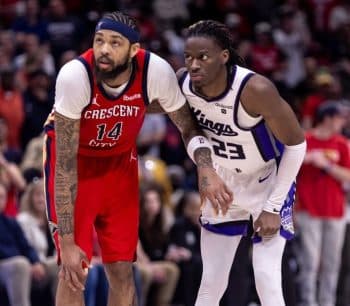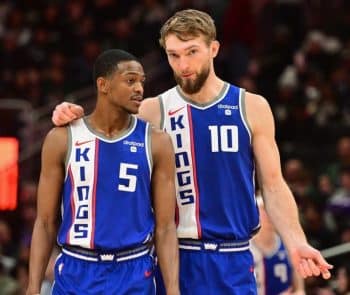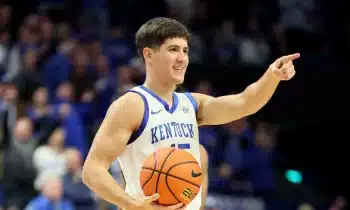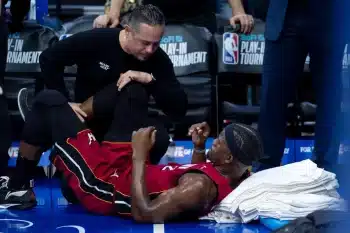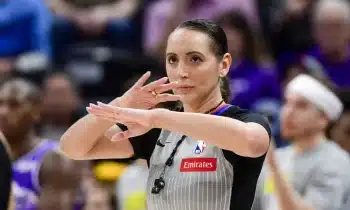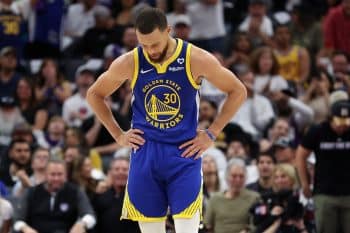NBA
NBA Sunday: For the Warriors and Cavs, Third Time’s the Charm

As you awaken on Christmas morning with loved ones and presents aplenty, take a moment to give thanks for the things that are truly important—such as the budding rivalry between the Golden State Warriors and Cleveland Cavaliers.
Together, they appear likely to accomplish something never before seen—meeting in the NBA Finals for three consecutive seasons.
With Kevin Durant visiting Cleveland for the first time as a member of the Warriors, Draymond Green, Kyrie Irving, Stephen Curry and LeBron James will renew their rivalry. And in all likelihood, it won’t be the last time these teams see each other this season.
* * * * * *
The NBA was originally founded as the Basketball Association of America back in 1946. The league merged with the National Basketball League in 1949 and began operating as the NBA. Still, the NBA recognizes its founding as having occurred in 1946, evidenced by its naming its 50 greatest players ever in 1996. Those 50 players were chosen to commemorate the league’s 50th anniversary.
What’s amazing to consider as it relates to the league’s long history (which now spans 70 years) is the relative dominance by a few franchises in terms of winning championships. In total, 19 different franchises have won the NBA Championship at least once, with only 10 of them having won more than once.
This June the league will crown a champion for the 71st time in its history. In other words, since 1946, there have been 140 conference champions crowned, with 141 and 142 coming this season.
Only 14 times in league history has a franchise won its conference at least three consecutive years. Amazingly, the Los Angeles Lakers are the only Western Conference team to have accomplished the feat, having done it six times. In the Eastern Conference, there have been eight such occurrences by a bevy of teams. Most notable would be the Boston Celtics, who won the conference ten consecutive years from 1957 to 1966 and four consecutive years from 1984 to 1987.
It’s plain to see then, that winning one’s conference at least three consecutive times is a fairly rare occurrence, and it’s highly unlikely that two teams would be similarly dominant in such a way that they would be able to each win their conference in consecutive years at the same time.
Yet, on Christmas Day in 2016, here we are.
In NBA history, there have been 13 NBA Finals rematches, but after the two teams met for the second consecutive season, for one reason or the other, there was never a third match up. Including last season’s NBA Finals rematch, teams rarely beat the same team in consecutive years in the NBA Finals. Michael Jordan’s Chicago Bulls bested the Utah Jazz in the 1997 and 1998 Finals, but prior to that, one would have to go all the way back to the 1968 and 1969 NBA Finals to find an instance where there was a rematch of the NBA Finals that saw the defending champion beat the same team again.
In other words, as the Warriors and Cavaliers renew their rivalry, the first important thing to note is that, if history is any indicator, the Cavs would face an uphill climb in attempting to defeat the Warriors for a second consecutive year in the NBA Finals.
Then again, if history is actually an indicator, these two teams may not end up squaring off for a third consecutive year. As top heavy as the league is renowned for being, there has never been an instance where two teams have faced each other three consecutive years in the Finals.
For the Warriors, though, they know all too well that there’s a first time for everything.
And this season, it appears that there will be another bit of NBA Finals history made.
* * * * * *
One of the things that makes Michael Jordan’s legacy so gargantuan is the fact that he appeared in six NBA Finals and won each of them. Kobe Bryant played in more Finals than Jordan (Bryant played in seven), but finished with a record of 5-2. In that regard, LeBron James trails each of them. To this point, James has played in seven NBA Finals, but has managed a won-loss record of just 3-4. If the Cavs were to win the Eastern Conference this season, though, James would obviously have an opportunity to go 4-4.
Looking at the numbers puts things into perspective. It’s difficult to maintain dominance at the highest level in professional sports, and it is especially difficult to do so when there are 30 teams jostling for the very level of supremacy that is in one’s grasp. For James, after winning the Eastern Conference with the Miami HEAT from 2011 to 2014, he has played in each of the last six NBA Finals, with the seventh being a real possibility.
The million dollar question then becomes whether or not that sort of dominance and sustained greatness is worth celebrating at all. Some would say yes, some would say no. But what we can say for certain is that history tells us that repeating isn’t as easy as one would think.
So as the Warriors and Cavs look ahead at a potential third straight battle in the NBA Finals, each of the franchises should be credited. What they have accomplished, even to this point, is incredibly difficult.
